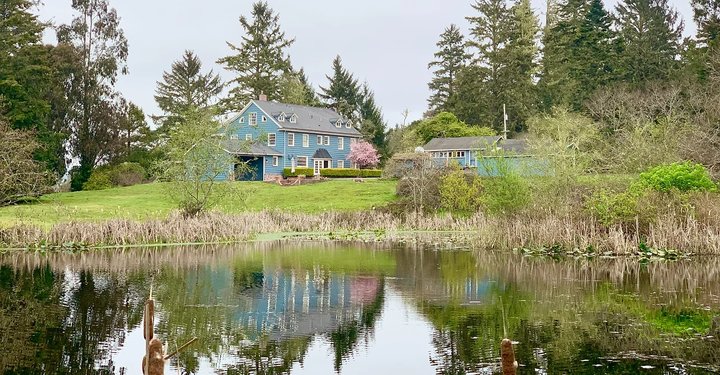The Sorell Leaf Healing Center at 124 Indianola Rd. is set to open in 2023 | Photos provided by Evan Buxbaum
###
Dr. Evan Buxbaum, who has worked as a pediatrician in Humboldt County for 11 years, recently had a patient who was suffering from a severe mental health crisis and was suicidal. Buxbaum had to send his patient to the emergency room at St. Joseph Hospital, where she stayed for 15 days, because there was no other facility that could take her.
That was when Buxbaum knew that something must be done to better accommodate children with mental health issues in our county.
“Our practice, and I think all the pediatric practices in the county, have been seeing increasing numbers of adolescents coming in, in significant mental health distress,” Buxbaum told the Outpost in a recent phone interview. “We’re seeing younger and younger kids experiencing the symptoms of anxiety, depression and suicidality.”
Anxiety, depression and self-harm among youths have been on the rise around the country for the last few years, a problem that was exacerbated by the isolation and stress from the COVID-19 pandemic. And with a lack of mental health resources available, hospitals and pediatricians have been overwhelmed with caring for children and adolescents in a mental health crisis.
This is why Buxbaum and his team, along with the Humboldt County Department of Health and Human Services (DHHS) Behavioral Health Branch, are creating the Sorrel Leaf Healing Center – a mental health crisis facility, the first of its kind in Humboldt, designed specifically to treat children and adolescents.
It will actually be the only mental health facility for children and teens for about 150 miles. Currently the closest options for treatment are in either Santa Rosa or Redding, and those centers are frequently at capacity. Currently, if a child or teen is reaches the point of a crisis or suicide attempt, the only local option is to send them to the emergency room. Adults in a mental health crisis are also often sent to the emergency room, causing the ERs to be packed past capacity and causing a chaotic and sometimes dangerous environment for patients and medical staff.
“It’s very hard on the staff in the emergency room because there’s really not a lot that they can do for these kids,” Buxbaum said. “And they just sit there, hour after hour, day after day, sometimes into the weeks.”
And the emergency room, which is not designed or staffed for mental health treatment, is not a particularly therapeutic environment for those in mental crisis. It is loud and chaotic, patients have little to no privacy, and with people coming in for medical emergencies, patients sometimes witness things that can be more traumatizing.
With the development of Sorrel Leaf, there will be an option for treating children and adolescents in a much more therapeutic environment. Located on a beautiful property on Indianola Road, the center will have four different service branches – crisis stabilization, crisis residential treatment, continuing aftercare and a mobile response team.
The mobile response team, Buxbaum told the Outpost, will consist of a vehicle staffed by a therapist and a caseworker, who will be available to go out into the community, into the emergency rooms, law enforcement offices and schools or the homes of a child is experiencing a mental health emergency. The goal of the mobile response team will be to de-escalate the crisis, provide immediate counseling and case management and, if possible, prevent hospitalization or the need for a higher level of care.
Patients can also be submitted to the crisis stabilization program, which Buxbaum explained is offered as sort of an alternative to the ER. There, patients are given a private room for up to 24 hours and will be offered intensive therapy, family counseling or medication support, if needed. “Ideally, from there, we want to be able to send the kids home or to a safe environment,” Buxbaum said.
If it is determined that the patient needs further care beyond the crisis stabilization, they can move to the crisis residential treatment facility, where they will do the “deep work,” Buxbaum said. The residential facility will implement different types of therapy including dialectical behavior therapy, cognitive behavior therapy, somatic therapy and therapy through exercise, yoga and breathing techniques. The center is also based on a farm and will use animal therapy and allow the patients to help care for the animals. The center will also focus on teaching kids to grow and prepare their own food as part of the center’s therapy model.
“I believe that a crisis is an opportunity for healing,” Buxbaum said. “And you don’t heal with a pill. Certainly medications help. But you heal by reconnecting to purpose, meaning and community in your life.”
Treatment at Sorrel Leaf will also include continuing aftercare, which would consist of continuing the forms of therapy that were most effective for the patient during their residential treatment, including individual or group therapy, to help prevent a mental health relapse. Another advantage to having a local facility like this, Buxbaum said, is that it will be much easier for the patients to have access to follow-up care.
Funding for the center will come largely from a $5.1 million California Health Facilities Financing Authority (CHFFA) Children and Youth Mental Wellness grant, which was awarded to the project about a year ago. The money was used for purchasing and retrofitting the property. Additional support will come from community partners Providence Humboldt County, the North Coast Grantmaking Partnership, the McLean Foundation, the Kurt Feuerman Foundation, Redwood Region Economic Development and various community members.
The center is expected to open in 2023 and Buxbaum and his team are currently working with designing engineers and an architect to renovate and remodel the building to fit the center’s needs. The next step will be staffing, which Buxbaum did acknowledge can be a challenge in Humboldt. Conducting recruitment efforts outside our area may be necessary. The center will also be looking to hire people from the social worker or psychology departments at Cal Poly Humboldt. Fully staffed, the center will employ about 30 people, Buxbaum said.
Buxbaum added that the center will strive to accommodate low-income families and will accept all types of insurance, including Medi-Cal. For those who are uninsured, the center will also have case management staff to connect families with financial services.
“There are programs like this in other areas, but they’re $2,000 a day,” Buxbaum said. “We’re trying to design the [kind of] program that the child of a Silicon Valley millionaire would have, only accessible to everyone.”


CLICK TO MANAGE